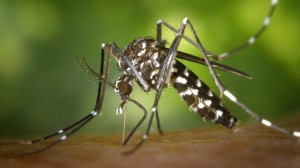Since 2006, an average of 28 cases of the mosquito-borne virus called Chikungunya [2] have been reported in the US, but all of those cases were in travelers returning to the US from countries where the virus is common.
Now the first US-acquired cases have now been reported:
From USA Today [3]:
Florida Health officials Thursday confirmed the first locally acquired cases of the mosquito-borne virus chikungunya. The two cases are the first instances in the U.S. in which the virus was not contracted during Caribbean travel, according to the Florida Department of Health.
The infected individuals were described as a 41-year-old woman in Miami-Dade County who began experiencing symptoms on June 10, and a 50-year-old man in Palm Beach County, who first noticed symptoms July 1.
Chikungunya cannot be transmitted from person to person. The virus is transmitted to humans [2] primarily by two species of mosquito: the tropical Aedes aegypti and Aedes albopictus (the Asian tiger mosquito). Both species have taken up residence in the southeast US and some parts of the southwest.
But here’s the disturbing part – when a mosquito bites someone who is infected with the virus and then bites another person, local transmission occurs. A mosquito carrying the virus can infect more than a dozen people in its lifetime.
According to the CDC [4], the two US-acquired cases don’t necessarily mean an outbreak will occur:
It is not known what course chikungunya will take now in the United States. CDC officials believe chikungunya will behave like dengue virus in the United States, where imported cases have resulted in sporadic local transmission but have not caused widespread outbreaks. None of the more than 200 imported chikungunya cases between 2006 and 2013 have triggered a local outbreak. However, more chikungunya-infected travelers coming into the United States increases the likelihood that local chikungunya transmission will occur.
An estimated 60-90 percent [2] of people who contract chikungunya develop symptoms, which usually appear 3-7 days after infection. The first two are typically the abrupt onset of a fever and joint pain. Other symptoms including headache, tiredness, nausea, vomiting, rash, and muscle aches may follow. The virus can be confirmed via a blood test.
Chikungunya rarely kills and most people recover completely, but sufferers are often unable to sit up for weeks. Those infected are sometimes debilitated and unable to work for several months.
Treatment focuses on remedies for pain, lots of rest, and ensuring adequate fluid intake to prevent dehydration.
As with most transmittable diseases, an ounce of prevention is worth a pound of cure. Knowing how to avoid mosquito bites and what to do if you are bitten can help you avoid this unpleasant virus and others associated with the blood-sucking pests.
For tips on how to avoid and repel the mosquitoes that transmit chikungunya, read Chikungunya: What is it, and how can you avoid it? [2]

